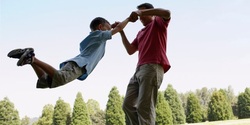
Roughhousing Boosts Your Kid’s Resilience
Helping your child develop a resilient spirit is one of the best things you can do as a parent. The ability to bounce back from failures and adapt to unpredictable situations will help your kids reach their full potential and live happier lives as adults. And an easy way to help boost your kids’ resilience is to put them in a gentle headlock and give them a noogie.
Roughhousing requires your child to adapt quickly to unpredictable situations. One minute they might be riding you like a horse and the next they could be swinging upside-down. According to biologist Marc Bekoff in his book Wild Justice, the unpredictable nature of roughhousing actually rewires a child’s brain by increasing the connections between neurons in the cerebral cortex, which in turn contributes to behavioral flexibility. Learning how to cope with sudden changes while roughhousing trains your kiddos to cope with unexpected bumps in the road when they’re out in the real world.
Additionally, roughhousing helps develop your children’s grit and stick-to-itiveness. You shouldn’t just let your kids “win” every time when you roughhouse with them. Whether they’re trying to escape from your hold or run past you in the hallway, make them work for it. Playtime is a fun and safe place to teach your kids that failure is often just a temporary state and that victory goes to the person who keeps at it and learns from his mistakes.
Roughhousing also helps children learn how to manage and deal with pain and discomfort. You shouldn’t intentionally hurt your kids while roughhousing (obviously), but little bumps and scrapes are bound to happen. Instead of cuddling and kissing a child’s “boo boo,” dads have a tendency to distract their kids from the pain with humor or some other task. Learning to deal with and manage minor discomforts while roughhousing can help your child handle the stresses they’ll encounter at school and work.
Roughhousing makes your kids smarter
Go ahead. Toss your kid like a sack of potatoes onto your bed. It will help turn him into a Toddler Einstein.
Psychologist Anthony Pellegrini has found that the amount of roughhousing children engage in predicts their achievement in first grade better than their kindergarten test scores do. What is it about rough and tumble play that makes kids smarter? Well, a couple things.
First, as we discussed above, roughhousing makes your kid more resilient and resilience is a key in developing children’s intelligence. Resilient kids tend to see failure more as a challenge to overcome rather than an event that defines them. This sort of intellectual resilience helps ensure your children bounce back from bad grades and gives them the grit to keep trying until they’ve mastered a topic.
In addition to making students more resilient, roughhousing actually rewires the brain for learning. Neuroscientists studying animal and human brains have found that bouts of rough-and-tumble play increase the brain’s level of a chemical called brain-derived neurotrophic factor (BDNF). BDNF helps increase neuron growth in the parts of the brain responsible for memory, logic, and higher learning–skills necessary for academic success.
Roughhousing Builds Social Intelligence
I’ve talked to several parents, especially moms, who are afraid to encourage roughhousing because they think it will turn their kids into little bouncing-off-the-walls hellians who will someday wind up in a juvie center. I guess I can see the reasoning behind their concerns–five-year-old play fights with dad; five-year-old thinks violence is fun; five year old turns into violent sadist bent on human destruction.
The problem is that research actually shows the opposite outcome: children who engage in frequent roughhousing are almost always more socially and emotionally adept than kids who don’t. Dr. Stuart Brown, an expert on play (Yeah, you can be an expert on play. Who knew?) says that the “lack of experience with rough-and-tumble play hampers the normal give-and-take necessary for social mastery and has been linked with poor control of violent impulses later in life.” That’s right. Wrestling your kid around in a play fight ensures that he doesn’t turn into the next Ted Bundy.
Roughhousing builds social intelligence in several ways. First, when kids roughhouse they learn to tell the difference between play and actual aggression. Dr. Pellegrini found in a survey among school-aged children that the ones who could tell the difference between play and real aggression were more well-liked compared to kids who had a hard time separating the two. The kids who mistook play for aggression often ended up returning their classmates good-natured overtures with a real punch in the kisser. The ability to differentiate between play and aggression translates into other social skills that require people to read and interpret social cues.
Roughhousing also teaches children about taking turns and cooperation. You might not recognize it, but when you horse around with your kids, you’re often taking part in a give-and-take negotiation where the goal is to make sure everyone has fun. Sometimes you’re the chaser and sometimes you’re the chasee; sometimes you’re pinning down your kids and other times they’re pinning you down. Your kids wouldn’t want to keep playing if they were constantly on the losing side. Everyone has to take turns in order for the fun to continue.
What’s interesting is that animals even take part in this back-and-forth role reversal. Adult wolves will expose their bellies and necks to their cubs and let them “win” the play fight. Stronger rats will handicap themselves during bouts of play and let the weaker rat win so play can continue. Roughhousing may be a way that God instilled into His creation a way of teaching cooperation to animals and humans, a necessary skill for the survival of a species.
The original post for this two-part series can be found at:
http://artofmanliness.com/2012/02/07/the-importance-of-roughhousing-with-your-kids/
BE HOLY.
BE A MAN
 RSS Feed
RSS Feed